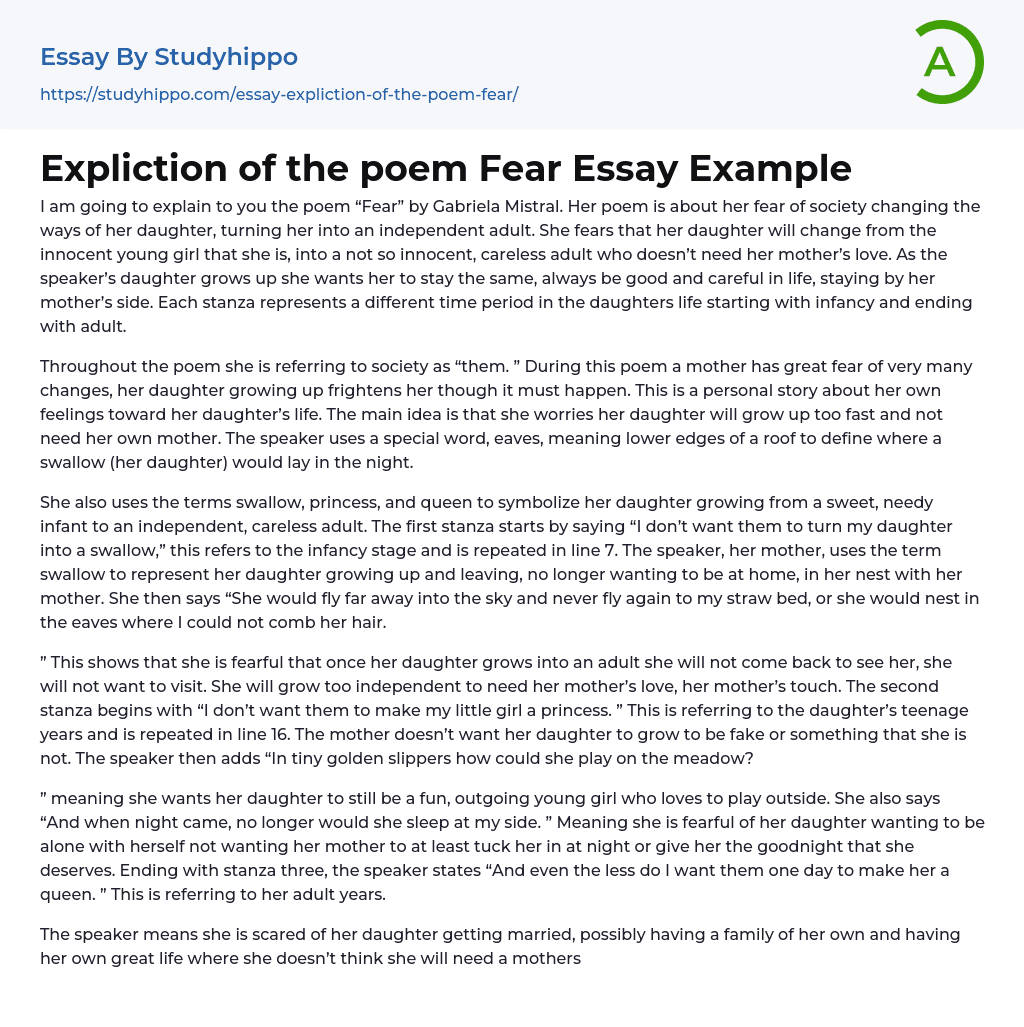I am going to explain to you the poem “Fear” by Gabriela Mistral. Her poem is about her fear of society changing the ways of her daughter, turning her into an independent adult. She fears that her daughter will change from the innocent young girl that she is, into a not so innocent, careless adult who doesn’t need her mother’s love. As the speaker’s daughter grows up she wants her to stay the same, always be good and careful in life, staying by her mother’s side. Each stanza represents a different time period in the daughters life starting with infancy and ending with adult.
Throughout the poem she is referring to society as “them. ” During this poem a mother has great fear of very many changes, her daughter growing up fri
...ghtens her though it must happen. This is a personal story about her own feelings toward her daughter’s life. The main idea is that she worries her daughter will grow up too fast and not need her own mother. The speaker uses a special word, eaves, meaning lower edges of a roof to define where a swallow (her daughter) would lay in the night.
She also uses the terms swallow, princess, and queen to symbolize her daughter growing from a sweet, needy infant to an independent, careless adult. The first stanza starts by saying “I don’t want them to turn my daughter into a swallow,” this refers to the infancy stage and is repeated in line 7. The speaker, her mother, uses the term swallow to represent her daughter growing up and leaving, no longer wanting to be at home,
in her nest with her mother. She then says “She would fly far away into the sky and never fly again to my straw bed, or she would nest in the eaves where I could not comb her hair.
” This shows that she is fearful that once her daughter grows into an adult she will not come back to see her, she will not want to visit. She will grow too independent to need her mother’s love, her mother’s touch. The second stanza begins with “I don’t want them to make my little girl a princess. ” This is referring to the daughter’s teenage years and is repeated in line 16. The mother doesn’t want her daughter to grow to be fake or something that she is not. The speaker then adds “In tiny golden slippers how could she play on the meadow?
” meaning she wants her daughter to still be a fun, outgoing young girl who loves to play outside. She also says “And when night came, no longer would she sleep at my side. ” Meaning she is fearful of her daughter wanting to be alone with herself not wanting her mother to at least tuck her in at night or give her the goodnight that she deserves. Ending with stanza three, the speaker states “And even the less do I want them one day to make her a queen. ” This is referring to her adult years.
The speaker means she is scared of her daughter getting married, possibly having a family of her own and having her own great life where she doesn’t think she will
need a mothers love. She then adds “They would put her on a throne where I could not go to see her. And when nighttime came I could never rock her…” The speaker is quite fearful of her daughter growing up and becoming her own independent self. The mother probably feels that she herself may be lonely in the night.
To sum up the poem, Fear, I will say that a mother is so scared of her daughter growing up and changing because of society that she can only see the bad outcome and not the good in it. The speaker thinks the daughter will start off being a precious infant and slowly turn to an independent woman who doesn’t need her mother. She doesn’t want them (society) to turn her infant into a swallow, her teenager into a princess, or her grown daughter into a queen. She worries too much of the bad when she should focus on the good outcome.
- Canterbury Tales essays
- Dulce Et Decorum Est essays
- My Last Duchess essays
- Beowulf essays
- Sir Gawain And The Green Knight essays
- The Road essays
- Aeneid essays
- Odyssey essays
- Blackberry Picking essays
- Beowulf Epic Hero essays
- American Literature essays
- Between The World and Me essays
- Book Report essays
- Book Review essays
- Book Summary essays
- Books essays
- Character essays
- Coming of Age essays
- Dante's Inferno essays
- Everyday Use essays
- Flowers for Algernon essays
- Genre essays
- Greek Mythology essays
- Incidents in The Life of a Slave Girl essays
- Letter essays
- Literary Criticism essays
- Literary devices essays
- Literature Review essays
- Metaphor essays
- Myth essays
- Play essays
- Plot essays
- Poem essays
- Poetry Analysis essays
- Protagonist essays
- Reader essays
- Reason essays
- Rhetoric essays
- Rhetorical Question essays
- Rhyme essays
- Simile essays
- Tragic Hero essays
- Translation essays
- Understanding essays
- Utopia essays
- Villain essays
- Writer essays




